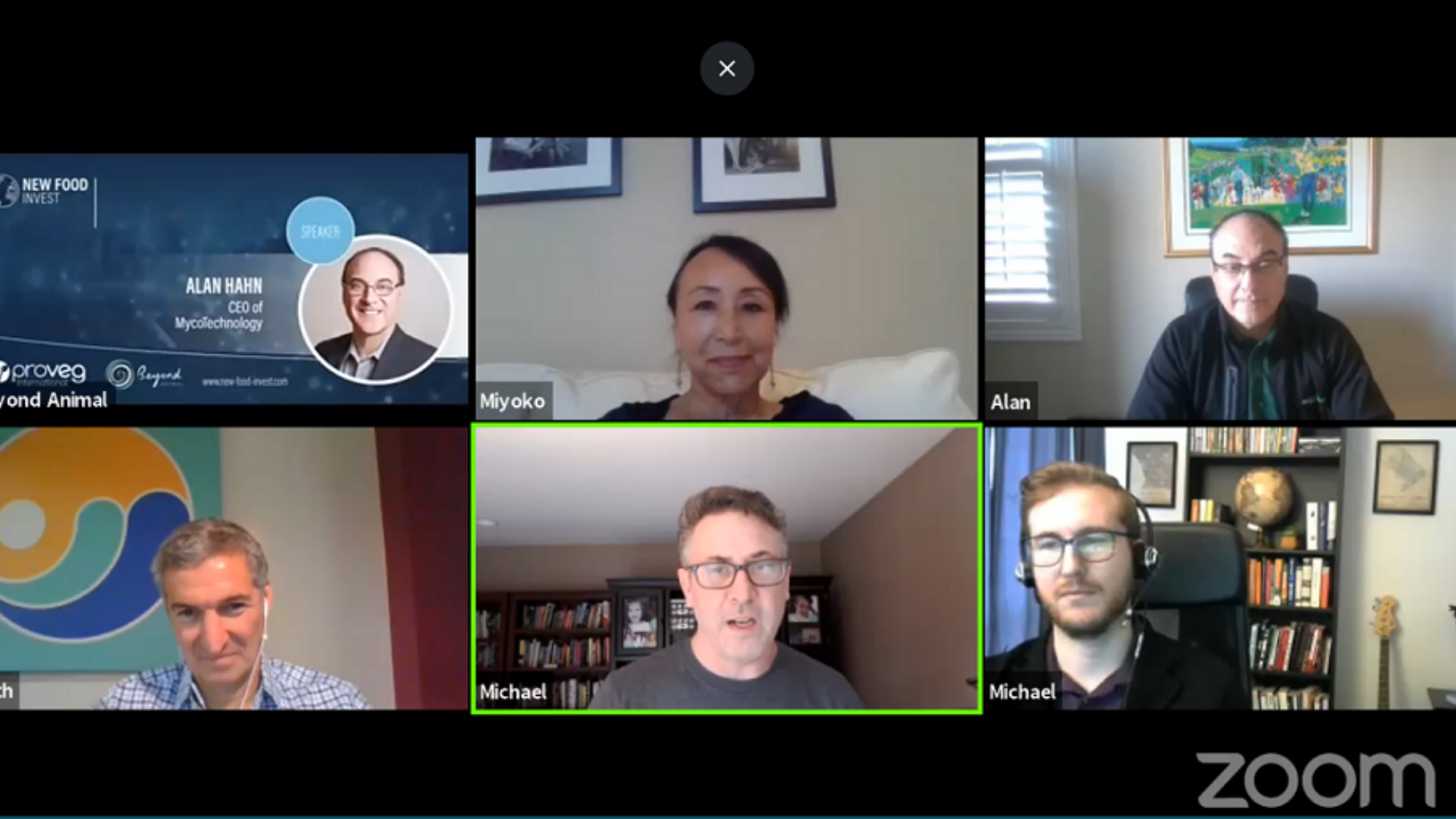The last few years saw products like dairy-alternatives to become supermarket staples and brands like Beyond Burger, Clara Foods and Impossible Foods became household names and investment-magnets. The plant-based sector is experiencing meteoric development and investment and is predicted to achieve a market valuation of $38.4bn by 2025 at a CAGR of almost 9% from 2019 when the vegan and animal-free boom was already well underway.
On March 18, plant-based foodtech experts participated in a virtual panel discussion on the Challenges of growing a plant-based business in the Americas at the New Food Invest conference organized by ProVeg and Beyond Animal to bring international plant-based and cultivated food startups together with investors and venture capitalists. The participants considered the challenges they faced in developing brands and innovating in the sector, and the shifting fortunes and fashions in foodtech.
Moderated by foodtech writer and creator of the Smart Kitchen Summit, Michael Wolf, the expert panel comprised: Alan Hahn, CEO of MycoTechnology, an American funghi-based foodtech that has raised $130m to date; Miyoko Schinner, CEO and founder of US-based dairy-alternative startup Miyoko’s Creamer, a pioneer in plant-based cheese; and Seth Goldman, co-founder of US companies PLNT Burger and Honest Tea, chair of Beyond Meat’s board of directors and founder of Eat the Change sustainable food platform.
Below is an extract from the panel discussion, edited for length and clarity.
Wolf: A new report says the amount of investment in plant-based food alternatives tripled to $3.1bn in 2020. Where are we in terms of the development of this marketplace?
Schinner: I think we're still at first or second base. If you just look at household penetration, we've got plant-based milks which are at the very top, but if you look in the vegan cheese category, for example, we still only have something like 2% household penetration. There's a huge segment of the population that still doesn't know that plant-based products exist. I actually had a meat alternative company back in the 90s and [at that time] I couldn't raise any money at all. Today, people are literally throwing money at me. So this is where we've gotten today. But if you just think about it, this is just the beginning. There's so much more penetration we have to do. I think we've got another 10–15 years of really, really solid growth in this arena before we get to the point where plant-based milks have gotten to today.
Goldman:The question still is, why do we need plant-based, and i think that it will be In the fourth or fifth innings when that question flips, and when people say that it costs less, it's environmentally better, nutritionally better and tastes better. So we're still at that first [base] where people are still curious and didn't realize you can have a plant-based burger that tastes as good or better, but also has other benefits. We're still in discovery mode.
When I talk to people about what's in some plant-based alternatives, some of them scratch their heads. Do we need to spend a lot of time educating the consumer?
Hahn: I think the meat industry did a brilliant job. You know, meat builds muscle; every sport is very meat-oriented but [meat] may not necessarily be the best way to build muscle. So I think there's definitely work to be done from a PR point of view. But I really think what it gets down to is, if we make plant-based food taste just as good as animal-based products or better, then the questioning stops, but I think we've got a long way to go.
I still think there's some market friction around things like incumbents pushing back, right? We've seen it with other industries with clean energy. There are lobbyists who basically pump lots of money into creating misinformation campaigns. How big a deal is that? And will that continue to create market friction?
Schinner: It has to be dealt with. We got pushback from the state of California regarding the usage of the term "butter” on our product and we were sanctioned by them. We filed a First Amendment lawsuit for a violation of our free speech and actually won a preliminary injunction. We are now able to use the term “vegan butter” as long as we qualified the term. I live in an area that is surrounded by animal agriculture and the sentiment against the plant-based industry is definitely strong. The [traditional farming] industry is actually fairly small and the farmers have been disappearing. There's been this major conglomeration of processors and small farmers have been struggling for a long time and so they see [plant-based industry] as a threat. Although it's really not us, it's what's happening within their own industry that is threatening their viability. They're basically sort of indentured servants to these large processors. So, I really do believe that we can help them participate in this new economy by helping them convert to growing crops instead of cows. It's happened throughout history, every time there's been some sort of revolution, and it's happening in a very surreptitious, quieter way with artificial intelligence. So we are going to have to reinvent the economic model across the board, whether it's technology or food, and we're all going to have to adapt.
Goldman: I've seen it as well in the organic industry. There was a period a few years ago when the big corporations were trying to block the rule that they would have to disclose their products with a GMO ingredient. Ultimately, the consumers won; transparency won. Anytime an industry tries to prevent a consumer from knowing what's in their product, that's not a good look for the industry. So I believe we have the consumers on our side on this. They want to be able to have these products, they want to know what's in them. So, absolutely, vegan butter is the clearest way to explain what that is. As much as those corporations have deep pockets, I'd rather have the consumer on our side. And I'm confident we do.
Just two years ago, the price of a plant-based hamburger at a restaurant was much more than it is today. What do we need to do to get pricing to true parity to existing agriculture and meat-based products? And how close are we?
Schinner: That's a hard one because animal agriculture is getting government subsidies which make prices artificially low. This industry is not getting grants or subsidies that will lower our prices. We actually have to charge the true price. We do need to fight on a legislative level to do away with subsidies so that we have true transparency on what it costs to produce food. But the other thing is simply scaling. We have to grow each of our industries, each of our companies to a point where we actually can compete and we have to be able to scale the supply chain. My costs have come way down since I first started. For example, our cashew prices are half what we were paying initially. So over time, we will be able to lower our prices, we actually lowered the price of butter, and look at what Impossible Foods has done. But we're still a long way off. We have to do a better job of knowing the consumer and there is a cost associated with cheap food that results in things like diabetes, cancer and heart disease; non-transparent hidden costs that we have to educate the consumer about. By participating in an organic, sustainable plant-based food system, we're gonna save money.
Animal agriculture is getting government subsidies which make prices artificially low
Goldman: Yes, it's mostly a matter of scale. When you use 99% less water, 93% less land, you have much lower input costs at least in terms of meat. And we said it at Beyond Meat a year ago, we'll be able to underprice at least one meat category within five years. So, now we're four years away from being able to deliver on that, and I'm confident we will.
Schinner: The economic model is going to shift over the next 10 to 15 years and precision fermentation, mycelium, all of these technologies are going to become far less expensive than animal agriculture. And that's when that will lead to the demise of animal agriculture, because we will reach price parity and beyond. We're just not there yet.
Hahn: Our biggest costs are the inputs that we transform through the fermentation with mycelia, and where we now have had some major breakthroughs. We have developed a way to take food waste streams, fruits and vegetables that would have gone to waste, and upcycle those and use those as growth media, and we are able to reduce our inputs cost by 90%. This is a big game-changer. We think we have one of the most viable ways to make next-generation protein strictly from mushroom mycelia and I hope to ink a big deal sometime this summer.
I know that each one of you has spent a lot of time thinking about interesting new plant-based ingredients. How many untapped interesting new novel ingredients are in the plant-based space?
Goldman: There are six crops that represent 57% of all agricultural output, six crops. And there are hundreds of thousands of crops, if you include mycelium, some say millions. We are so monoculture-oriented as an economy. And of course, from a climate perspective, from a diet perspective, that's just not smart and it's a bad risk profile.
Schinner: We'renow discovering functionalities in plant milk that no one looked at before. We've had very set ideas about what plants do. We never thought, what if we took this plant and we fermented it or made milk out of it. It's like Lego, you take building blocks as ingredients, you call up the buyer for multiple ingredients extracted from plants, then put back together in different things. Why not just keep that plant on tap, through processes such as heat insulation and fermentation to see what it can do and how it can be transformed into a product that we recognize such as cheese or butter? We've been doing a deep dive into plant functionality and performance and actually concentrating the proteins in the milk themselves, rather than extracting the proteins from something and then putting it back into something else. We're using plants that are sort of a waste byproduct like seeds. There's so much more research that we have to do, so here we're not even at the first innings yet.
Goldman: And each continent has its own indigenous land for these as well. So we really can localize and use indigenous crops.
Hahn: I think we also need to get away from doing analogs; we need to use plants, to their best form, deliver the best nutritional profile without trying to copy what an animal protein or animal food looks like. That's when we've really made it – when we stop doing animals and it doesn't look like anything you've got from an animal.
Schinner: Absolutely right, this unleashes our creativity and pushes the human palette to explore new cuisines and new foods. There was a time when Europeans went to Asia and discovered pasta. They brought back noodles and all of a sudden, look at the Italian culture. We really have to start thinking not of transitional foods, but what else there is to eat; how we can celebrate the bounty that nature provides. We have this obsession in the western world with protein. You do not have to eat a concentrated form of protein to get protein. You get protein every time you eat, so it's about education. We also have to realize that our palates change in a matter of weeks, so if you stop eating cheese or meat after three or four weeks, chances are, you will lose your desire for them because your palate has now changed. I think our industry is sort of a transitional industry and I hope for a future where humans embrace the local foods that they grow, that are grown from the ground, not from animals.
Hahn: We really need to get there because the US is one of the richest countries in the world [but only] about 12% percent of the population gets the right amount of nutrients every day. Most people are eating junk food or food that's devoid of all nutritional value.It's a high density of calories, that's it. We really have got to get to where nutrition is key not necessarily just protein.
Is there room for lots of creativity in the culinary space with some of these leading-edge culinary innovators to embrace plant-based even more?
Schinner: Absolutely. I went vegan back in the 1980s. And that's really what kicked off my lifelong journey through entrepreneurship, writing cookbooks and developing food products because I was forced to think outside the box. That's what any kind of restriction does, it makes you open up the imagination and your creativity.
What is the likelihood of seeing more IPOs or more investors in this area?
Goldman: I think you are seeing more IPOs and also SPACs, which are not quite the same. But, successful IPOs will be based on real companies growing real products and real volume. That is absolutely happening. We all agree we're sort of at the bottom of the first innings, but by the time we get to the fourth or fifth innings, large parts of our economy will be based on plant-based foods and plant-based consumer goods and plant-based eating. So, you'll certainly see more opportunities for more investors.
Hahn: I think the IPO market has gone crazy. You're looking at 40 new SPACs a day being formed right now. You'll see a lot of plant-based companies go public through SPACs, so there'll be a lot of ways to invest.
We are seeing like an eight-person team driving an eight-billion valuation. Remember the first dotcom boom? Are we getting into overvaluations or are the valuations justified?
Hahn: The plant-based space has been under-invested in from the beginning. We're a fraction of 1% of the investment that goes into tech. So, it's just shifting and putting money into plant-based businesses and moving into the public space. The public is pouring the money in and they're getting higher valuations. I think it's a shifting of capital, I think there's a belief that this is the future of food, and people are putting money where their mouth is.
The plant-based space has been under-invested in, we're a fraction of 1% of the investment in tech
Goldman: I think the difference with the dotcom era is that I was out there trying to raise $25,000 at that time for a bottle of tea and a label. It was challenging; I saw my classmates raising millions of dollars for a business model that had no real margin. There was some revenue at some point, but no real margin. I think, when you look at plant-based, it all comes down to if you think there are margins to this business. And, obviously, that depends on the company. And if there is growth, and if there are margins plus growth, you can make a calculation about whether [the valuation] is appropriate.
Where are the investment dollars going today in plant-based? What is the biggest need for capital? What are we funding in some of these rounds?
Hahn: Well, I think you're really funding companies to build big plants. It's not like the virtual world of Silicon Valley, where you create software, and you rinse and repeat the software, selling it over and over again. You actually have to put steel in the ground; you have to make something physical and hopefully create a great model of repeat business and growth. It takes physical capacity in order to make food and that's a real difference between when I started raising money eight years ago for micro-technology in Silicon Valley. They were looking at me like I was crazy: “What? Food? No, we want software, you know, you build it one at one time and you sell it millions of times.” Now, everybody in Silicon Valley wants to invest in food technology. What they're investing in is physical assets, which for a lot of investors, they're not very comfortable with.
What is the biggest surprise you had in building your plant-based businesses?
Schinner: It's just the speed at which things are changing. I thought it was going to be a much slower process; there's a new player every single day.
Goldman: For me, there were two surprises. The first is the pace of the movement; we were the first to launch organic tea back in 1999 and organic as a category is still roughly 4 –5%. It grows, but it's a slow uphill trend. Plant-based is really exploding and you're seeing it culturally; you look at the grocery store and you have plant-based meat sections. The other surprise is how much better these products are than when we became vegetarians more than a decade ago. Then, you had to settle for something that was inferior in taste, texture, aroma, not to mention the nutritional aspects. Not only are [plant-based] products so much closer to the analogs now, but actually are on a path that can be at parity or better. Idon't think this was a mindset that that was possible, even 10 years ago. So it is a really exciting time to be in this movement.
Hahn: I think the biggest surprise to me is how slow big food companies move to change. It is so painful for us. When you get the big food companies to make a change, that impacts so many more people, and so we are helping big food companies to make the transition. As I call it, the gazelles and elephants. For us, a B2B ingredient company, we have to work with both small, fast-moving gazelle companies that hopefully grow to be big elephants. And we also try to convince some elephants to do the right thing. And I think the biggest thing that we're focused on is about sugar and salt reduction, which are both out of control in food, and how to do it without compromising taste. We've got to get the elephant in the room to embrace it in order to have food that is better for you.
Goldman: One of the reasons we were excited to see Beyond Meat go public was because we knew nobody was going to invest as much into this vision of making meat from plants. If we had sold it, it would have been folded into somebody's R&D department and marginalized: When you can stand alone with your vision, you have a much better chance of going further and driving the science and the consumer even further.
CompassList is an official media partner of New Food Invest 2021.











